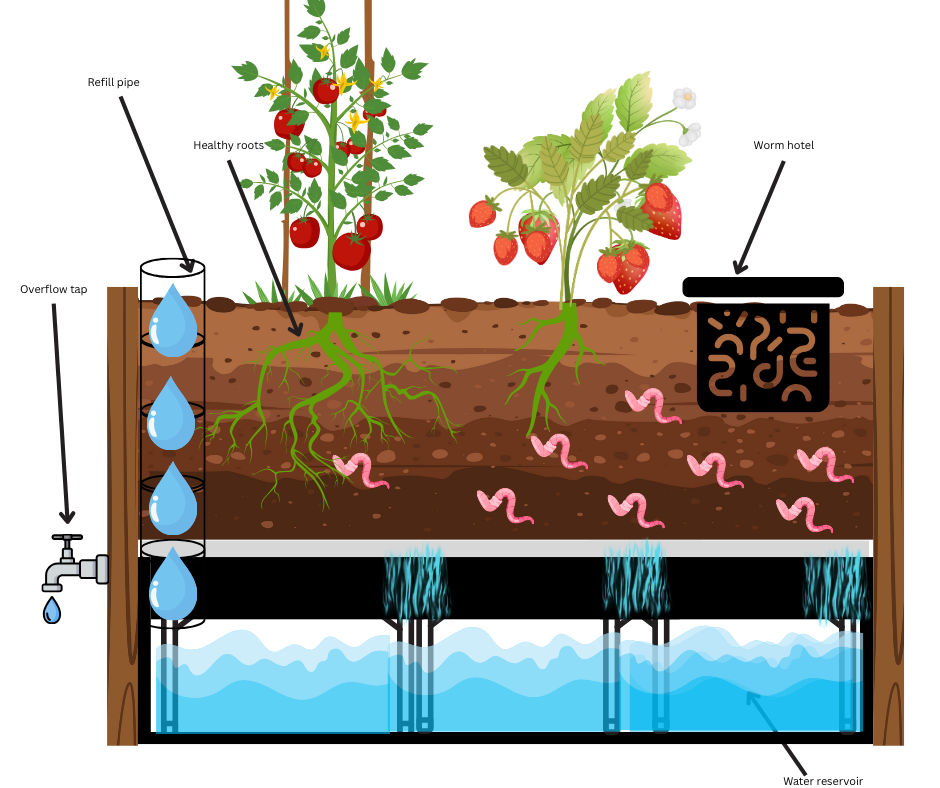Seasonal Planting Guide for NSW: Best Fruits & Vegetables to Grow Year-Round in Your Wicking Bed
- Andrew Milne
- Oct 13, 2025
- 3 min read
One of the best things about living in New South Wales is our mild climate, which allows for a wide variety of fruits and vegetables to be grown all year round. Whether you’re an experienced gardener or just starting out with a new wicking bed, choosing the right plants for each season is key to a thriving, low-maintenance garden.
Wicking beds make growing your own food easier by keeping soil moist from below, reducing water use and plant stress — perfect for hot Aussie summers or dry spells.

🏡 Why Seasonal Planting Matters
Planting the right crops at the right time helps:
Maximise yields and flavour
Reduce pest and disease problems
Minimise watering and maintenance
Ensure your wicking bed is always productive
Below is a season-by-season planting guide for NSW (temperate climate zones), ideal for backyard gardens and wicking beds.
🌸 Spring (September – November)
Spring is one of the most exciting times in the garden. The soil is warming up, days are getting longer, and plants grow fast.
Best vegetables to plant:
Tomatoes
Cucumbers
Zucchini
Lettuce
Capsicum
Beans
Corn
Best fruits to plant:
Strawberries (great in wicking beds)
Blueberries
Passionfruit
Melons (rockmelon, watermelon)
✅ Wicking bed tip: Spring is the perfect time to set up a new wicking bed. The consistent moisture will help young seedlings establish quickly.
☀️ Summer (December – February)
Hot, dry conditions can make gardening tricky—but wicking beds shine in summer because they keep roots cool and hydrated.
Best vegetables to plant:
Sweet corn
Chillies
Eggplant
Basil and other herbs
Pumpkins (early summer)
Lettuce (choose heat-tolerant varieties)
Best fruits to plant:
Rockmelon & watermelon
Passionfruit
Citrus (lemons, limes, oranges)
✅ Wicking bed tip: Mulch well to keep the topsoil cool and reduce evaporation. Check your reservoir regularly to make sure it’s topped up.
🍂 Autumn (March – May)
Autumn is a productive time with mild weather and good soil moisture. Perfect for cool-season crops.
Best vegetables to plant:
Broccoli
Cauliflower
Cabbage
Carrots
Spinach
Beetroot
Radish
Best fruits to plant:
Strawberries (for a strong spring crop)
Apples and pears (bare-root planting late autumn)
Rhubarb crowns
✅ Wicking bed tip: Autumn crops thrive in steady moisture. Wicking beds prevent stress that can cause bolting or bitter flavours in greens.
❄️ Winter (June – August)
Even in winter, you can keep your wicking bed productive with hardy, cold-tolerant crops.
Best vegetables to plant:
Garlic (plant in June for harvest in spring)
Onions and leeks
Kale
Spinach
Peas
Broad beans
Best fruits to plant:
Bare-root fruit trees like apples, pears, plums and peaches
Citrus (in frost-free areas)
✅ Wicking bed tip: Growth slows down in winter, so you’ll use less water. Keep weeds down and top up compost to prepare for spring.
🌿 Top Crops That Thrive in Wicking Beds Year-Round
Some plants love the consistent moisture and do well in wicking beds almost any time of year in NSW:
Herbs (basil, parsley, mint, coriander, oregano)
Lettuce and leafy greens
Strawberries
Tomatoes (if protected from frost)
🪴 Final Tips for Seasonal Planting Success
Start with healthy soil: Rich, organic soil helps retain nutrients and moisture.
Use crop rotation: It keeps soil healthy and reduces pests.
Mulch generously: Especially important in summer.
Keep your reservoir full: Consistent moisture is the secret weapon of wicking beds.
Choose the right varieties: Local nurseries often stock varieties best suited to NSW’s climate.
🌻 Grow Year-Round with a Wicking Bed
If you want to grow your own fresh produce with less maintenance and less water, a wicking bed is the perfect solution. With the right plants at the right time, your backyard can produce food every season.
_edited.jpg)





Comments